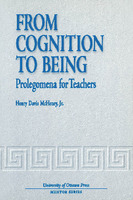From Cognition to Being
Prolegomena for Teachers
Abstract
In this book, McHenry challenges the still-regnant paradigm of knowledge acquisition as the end and means of schooling, supplanting it with an inquiry into what knowledge is. Tracing the development of the idea of knowledge from its roots in Descartes and Locke through the ontological turn in Wittgenstein, Heidegger, and Buber, he provides an alternative rationale and vocabulary for a practice of schooling that engages teachers with students in <i>being-together-and-inventing. </i>Philosophically centered though accessibly written, with examples from the author’s personal experiences with his own child and his students, the book engages the reader in inquiry rather than argument, leaving her not with a list of tips and prescriptions, but with a capacity for encounter with the actual persons in her classroom.
Keywords
schooling; students; teachers; Ferdinand de Saussure; John Locke; Ludwig Wittgenstein; Martin Heidegger; Ontology; Paradigm; René DescartesDOI
10.26530/OAPEN_578817ISBN
9780776615967OCN
181843560Publisher website
https://press.uottawa.ca/Publication date and place
1999Series
Mentor Series,Classification
Education


 Download
Download